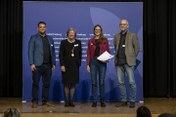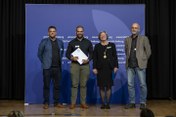Bernstein-CorTec Award 2024
Click here for the English version
Der Bernstein-CorTec Preis zeichnet hervorragende wissenschaftliche Leistungen im Bereich Computational Neuroscience und Neurotechnologie aus. Der Preis wird jährlich alternierend für Promotionen oder Masterarbeiten verliehen. Im Jahr 2024 wird der Preis für Promotionsarbeiten verliehen.
Die jetzt ausgezeichneten Doktorarbeiten befassen sich mit folgenden Themen:
1. Enya Paschen: Mesiale Temporallappenepilepsie (MTLE) ist die häufigste fokale Epilepsie bei Erwachsenen.  Trotz der Fortschritte in den pharmakologischen, chirurgischen und neuromodulatorischen Behandlungsstrategien, erreichen viele Patienten keine ausreichende Kontrolle ihrer epileptischen Anfälle. Enya Paschen fokussierte in ihrer Dissertation auf die Entwicklung neuer Neuromodulationstechniken und deren Effekte auf Anfallsaktivität und kognitive Funktionen in MTLE. Sie fand dass niederfrequente Stimulation (LFS, optogenerisch oder elektrisch) im Hippocampus die Anfallsentstehung unterdrückt und nicht die Kernfunktionen des Hippocampus wie Lernen, räumliche Navigation und Gedächtnis beeinträchtigt. Damit konnte sie LFS als ein effektives Stimulationsprotokoll und einen alternativen Therapieansatz für behandlungsresistente MTLE-Patienten vorstellen.
Trotz der Fortschritte in den pharmakologischen, chirurgischen und neuromodulatorischen Behandlungsstrategien, erreichen viele Patienten keine ausreichende Kontrolle ihrer epileptischen Anfälle. Enya Paschen fokussierte in ihrer Dissertation auf die Entwicklung neuer Neuromodulationstechniken und deren Effekte auf Anfallsaktivität und kognitive Funktionen in MTLE. Sie fand dass niederfrequente Stimulation (LFS, optogenerisch oder elektrisch) im Hippocampus die Anfallsentstehung unterdrückt und nicht die Kernfunktionen des Hippocampus wie Lernen, räumliche Navigation und Gedächtnis beeinträchtigt. Damit konnte sie LFS als ein effektives Stimulationsprotokoll und einen alternativen Therapieansatz für behandlungsresistente MTLE-Patienten vorstellen.
2. Eric Klein beschreibt In seiner Dissertation das erste funktionale optische Cochlea-Implantat (oCI), das auf integrierten μLEDs basiert und erfolgreich in vivoeingesetzt wurde. Um eine möglichst hohe Anzahl individuell adressierbarer μLEDs zu integrieren, evaluierte er verschiedene Routing-Schemata, sowohl mit ein- und mehrschichtige Metallisierung. Aufgrund intensiver Evaluierung der ersten oCI-Generation, wurde ein neuer einschichtiger Verbindungsansatz entwickelt und charakterisiert, der sich als effizienter erwies als das üblicherweise für LED-Arrays verwendete mehrschichtige Multiplexing-Schema. Auf der Grundlage von In vivo Tests, durchgeführt in Zusammenarbeit mit Projektpartnern, kam er zum Schluss, dass eine einzelne μLED in der Lage ist, optogenetisch modifizierte Nervenzellen in der Cochlea effizient zu stimulieren. Darüber hinaus wurde nachgewiesen, dass die μLED-Arrays der oCIs die spektrale Streuung im Vergleich zum klinischen elektrischen Cochlea-Implantat um bis zu 5 Oktaven verringern und damit den Cochlea-Implantat-Patienten eine wesentlich höhere Frequenzauflösung bieten.
auf integrierten μLEDs basiert und erfolgreich in vivoeingesetzt wurde. Um eine möglichst hohe Anzahl individuell adressierbarer μLEDs zu integrieren, evaluierte er verschiedene Routing-Schemata, sowohl mit ein- und mehrschichtige Metallisierung. Aufgrund intensiver Evaluierung der ersten oCI-Generation, wurde ein neuer einschichtiger Verbindungsansatz entwickelt und charakterisiert, der sich als effizienter erwies als das üblicherweise für LED-Arrays verwendete mehrschichtige Multiplexing-Schema. Auf der Grundlage von In vivo Tests, durchgeführt in Zusammenarbeit mit Projektpartnern, kam er zum Schluss, dass eine einzelne μLED in der Lage ist, optogenetisch modifizierte Nervenzellen in der Cochlea effizient zu stimulieren. Darüber hinaus wurde nachgewiesen, dass die μLED-Arrays der oCIs die spektrale Streuung im Vergleich zum klinischen elektrischen Cochlea-Implantat um bis zu 5 Oktaven verringern und damit den Cochlea-Implantat-Patienten eine wesentlich höhere Frequenzauflösung bieten.
Enya Paschen arbeitet jetzt als Behavioral Pharmacology & EEG Team Leader bei Ulysses Neuroscience Limited, einer privaten irischen Forschungs- und Entwicklungsorganisation.
Eric Klein verfolgt seine wissenschaftlichen Interessen als Postdoc im Institut für Mikrosystemtechnik (IMTEK) an der Universität Freiburg.
Preisvorträge - Safe the date!
Die beiden PreisträgerInnen werden am 14. Januar 2025 um 17:15 Uhr in einem Extra Bernstein Seminar über ihre preisgekrönte Arbeiten berichten.
Kontakt
Prof. Dr. Ad Aertsen
Bernstein Center Freiburg
Albert-Ludwigs-Universität Freiburg
Email: aertsen@biologie.uni-freiburg.de
Bernstein-CorTec Award 2024 goes to two young researchers
Prof. Kerstin Krieglstein, Rector of the University of Freiburg, awarded the Bernstein-CorTec Prize for Computational Neuroscience and Neurotechnology to two young researchers, Enya Paschen and Eric Klein, on the morning of 16 October.
The Bernstein-CorTec Prize honors outstanding scientific achievements in doctoral and master's theses in the field of computational neuroscience and neurotechnology. The prize is awarded annually, alternating between doctoral and master's theses. In the year 2024, the prize is awarded to doctoral theses.
The two award-winning doctoral theses deal with the following topics:
1. Enya Paschen: Mesial temporal lobe epilepsy (MTLE) is the most common focal epilepsy in adults. Despite advances in pharmacological, surgical and neuromodulatory treatment strategies, many patients do not achieve adequate control of their epileptic seizures. Enya Paschen's dissertation focussed on the development of new neuromodulation techniques and their effects on seizure activity and cognitive functions in MTLE. She found that low-frequency stimulation (LFS, optogeneric or electrical) in the hippocampus suppresses seizure onset and does not impair core hippocampal functions such as learning, spatial navigation and memory. She was thus able to present LFS as an effective stimulation protocol and an alternative therapeutic approach for treatment-resistant MTLE patients.
2. Eric Klein: His thesis describes the first functional optical cochlear implant (oCI) based on integrated μLEDs successfully applied in vivo. In order to integrate the highest possible number of individually addressable μLEDs, he evaluated different routing schemes, implementing single- and multi-layer metallization. Based on conclusions drawn during the intense evaluation of the first oCI generation (oCI-1), a new single layer interconnection approach was developed, characterized, and found to be more efficient than the commonly used multi-layer based multiplexing scheme for LED arrays. Based on in vivo tests performed in cooperation with project partners, he concluded that a single μLED is capable of efficiently stimulating optogenetically modified nerve cells in the cochlea. It was further demonstrated that the μLED arrays of the oCIs reduce the spectral spread, compared to a clinical style electrical cochlear implant, by up to 5 octaves, thereby providing much higher frequency resolution to the cochlear implant patients.
Enya Paschen works now as Behavioural Pharmacology & EEG Team Leader with Ulysses Neuroscience Limited, a private Irish Research and Development Organisation. Eric Klein is now pursuing his scientific interests as a postdoc in the Inst. for Microystems Engineering (IMTEK) at the University of Freiburg.
Award Lectures
Both awardees will present their research in an Extra Bernstein Seminar on January 14 at 17:15 hours in the Bernstein Center Freiburg.
Contact
Prof. Dr. Ad Aertsen
Bernstein Center Freiburog
University of Freiburg
Email: aertsen@biologie.uni-freiburg.de

